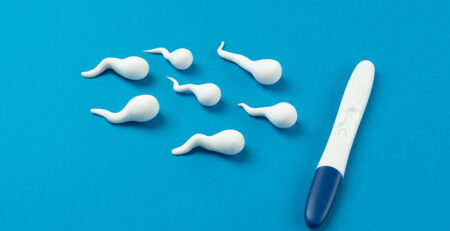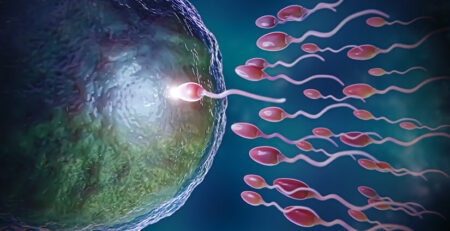What is Azoospermia?
Azoospermia is a condition found in males whose semen ejaculation contains no sperm. This type of infertility is considered one of the most severe. However, various male infertility treatment options are available to treat such conditions.
There could be various reasons behind Azoospermia.
Let’s take a look at those.
A False Report
A false report in azoospermia is a semen analysis that incorrectly indicates that there are no sperm in the ejaculate. This can happen for several reasons, including:
- Technical error: The semen sample may not have been collected or processed correctly.
- Laboratory issues: The lab may not be fully equipped to conduct the semen test properly.
- Un-skilled Technician: The person conducting the test may not be skilled enough to evaluate the sample properly.
- Insufficient sample volume: The sample may not have been large enough to contain any sperm.
- Sperm concentration too low: The sperm concentration may be so low that the routine semen analysis does not detect them.
The no-sperm report can also happen due to Cryptozoospermia, which means the sperms are hidden, and the semen sample needs to be centrifuged and concentrated in a pellet to make the sperms evident. This is also part of male infertility treatment.
If the false report is not the reason, then Azoospermia can be identified in two forms:
- Obstructive Azoospermia
- Non-Obstructive Azoospermia
Obstructive Azoospermia
Obstructive azoospermia is a condition in which there are no sperms in the ejaculate due to a blockage in the male reproductive tract. The blockage can occur anywhere, from the testicles to the urethra.
Some of the common causes of obstructive azoospermia include:
- Varicocele: A varicose vein in the scrotum that can damage the tubes that carry sperm.
- Blockage in the epididymis: The epididymis is a tube that stores sperm before they are released. A blockage in the epididymis can prevent sperm from reaching the urethra.
- Blockage in the vas deferens: The vas deferens is the tube that carries sperm from the epididymis to the urethra. A blockage in the vas deferens can prevent sperm from reaching the urethra.
- Infection: An infection of the male reproductive tract can damage the tubes that carry sperm.
- Surgery: Surgery on the male reproductive tract can damage the tubes that carry sperm.
Absence of ducts of reproductive tract can also be one reason for azoopsermia, this is known as congenital bilateral absence of vas deferens (CBAVD) where sperms are produced but can not be transported to ejaculate because of absence of reproductive tract duct.
To treat obstructive azoospermia causing male infertility, direct aspiration of sperm is carried out, either from the epididymis or the testes this technique is known as percutaneous epididymal sperm aspiration (PESA) and testicular sperm aspiration (TESA) respectively.
Non-Obstructive Azoospermia
Non-obstructive is another form of azoospermia, where the production of sperm is hampered at the testicular level. This defective production of sperm could be due to various reasons.
- Deficiency of sperm-stimulating hormones that aid in sperm production. Supplementation with such hormones can cure non-obstructive azoospermia.
- Testicular failure is another cause of this condition, wherein the sperm is not coming in the ejaculate but is present in some patchy areas in the testes. To treat this problem, testicular sperm extraction (TESA) or Microsurgical testicular sperm extraction (Micro TESA) is used.
The extracted sperm is then directly injected into the female egg using ICSI treatment for male infertility.
Now, if a couple is facing the problem of Azoospermia and is keen on conceiving a child, multiple options are available to conceive with self sperm or donor sperm from ART banks is available in cases where nothing is working for them. This can help carry out a successful IVF cycle and assist in the conception of a child.
As we sign off, please remember that it is important to approach a fully equipped IVF centre in Delhi to get the correct diagnosis of male infertility and take the required course of treatment.












